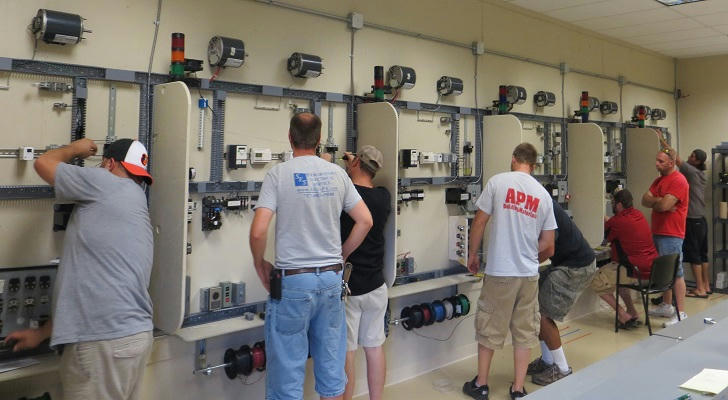Power Your Future: Government-funded Electrician Courses in Just 16 Weeks
📢 Career change option/Certificate program/No admission requirement/No age limit
In the UK, the demand for qualified electricians continues to rise. With the shift toward renewable energy, smart homes, and upgraded infrastructure, skilled tradespeople are more important than ever. Recognising this, the UK government actively supports training programmes—such as apprenticeships and Skills Bootcamps—that help people of all backgrounds gain the skills needed to enter this essential profession.

Why Become an Electrician?
Electricians play a critical role in modern society, from maintaining domestic wiring to installing energy-efficient systems in new commercial buildings. The work is stable, varied, and pays well—newly qualified electricians in the UK can expect to earn £25,000–£30,000 per year, with experienced professionals often making over £40,000.
Becoming a certified electrician also opens doors to self-employment, contract work, and career progression into supervisory or inspection roles. Thanks to government-supported training, entering the field is now more accessible than ever.
Flexible Programme Options – Learn in as Little as 16 Weeks
The UK offers several types of electrician training programmes designed to suit different life situations and career goals:
Skills Bootcamps (lasting up to 16 weeks): These government--backed intensive courses focus on key skills such as electrical installation, wiring regulations, and workplace safety. They’re ideal for adults looking to switch careers or quickly upskill.
Apprenticeships (typically 3–4 years): Ideal for younger learners or those seeking a fully immersive, long-term path into the industry, combining real-world experience with academic learning.
Level 3 NVQ Diplomas and Technical Certificates: These qualifications often follow Bootcamps or apprenticeships and are essential for full registration as a qualified electrician.
Each option leads to valuable credentials—such as the AM2 assessment or NVQ Level 3 certification—greatly improving employment prospects in a high-demand field.
Supported by the Government and Employers
Cost is not a barrier. Many of these programmes, particularly skills bootcamps, are supported by the UK government and participating employers. In many cases, learners don’t need to worry about course costs, especially if they are unemployed, self-employed or changing careers. This support ensures that high-quality training is available to people regardless of their financial background.
Case Study 1: James, 28, Career Changer
James had spent several years working in retail management but wanted a more hands-on, future-proof career. He enrolled in a 16-week Skills Bootcamp in Electrical Installation, which included both in-person workshops and online theory modules. After passing his end-of-course assessment, James received a certificate of completion and is now working as a trainee electrician, earning while gaining practical experience toward his NVQ Level 3.
Case Study 2: Sarah, 38, Returning to Work
Sarah took a break from the workforce to raise her children and later decided to retrain in a practical trade. The government-supported electrician Bootcamp allowed her to study part-time while managing her family responsibilities. After finishing the course, she was hired by a local electrical firm that values trained applicants with current knowledge of UK wiring standards.

How to Apply – Step by Step
- Find a Course
Search for electrician training programmes on gov.uk, the National Careers Service, or at your local college. Look for Level 2 or Level 3 electrical installation courses that mention government funding.
- Check Your Eligibility
Most courses are open to adults aged 19 and over, regardless of prior experience. No advanced qualifications are usually required.
- Submit Your Application
Apply online through the provider’s website. Some may invite you to an information session or ask for a short skills assessment.
- Ask About Funding Support
These government-backed courses are often supported in a way that removes the burden of tuition costs. Ask your provider about what support is available and what certificate you’ll receive upon completion.
Open to All Ages
Electrician training in the UK is open to individuals across a wide age range:
19–30 years: Apprenticeships offer an ideal pathway for young people seeking a structured learning pathway and on-the-job training.
31–50 years: Many people in this group use Skills Bootcamps to retrain, switch careers, or increase their earning potential.
50+ years: It’s never too late to enter the field. Some programmes are designed to accommodate mature learners seeking new challenges or a second career.
There are no upper age limits, and courses often provide additional support for those who have been out of education for some time.
Recognised Certification and Employment Pathways
Most government-supported courses include certification upon completion. These may be attendance-based certificates, or more formal qualifications such as:
City & Guilds Level 2/3 Technical Certificates
NVQ Level 3 in Electrotechnical Systems
AM2 Assessment (final exam for electricians)
CSCS Card (for site work eligibility)
These credentials are recognised by employers throughout the UK and are essential for legally working as an electrician or progressing in the trade.
A Career That Powers the Future
Training as an electrician is not just about finding a job—it’s about gaining a valuable skill set that’s essential for the UK’s economic and environmental goals. With government-backed training, students can study without worries, and flexible course structures lasting as little as 16 weeks, there has never been a better time to plug into a brighter future.
